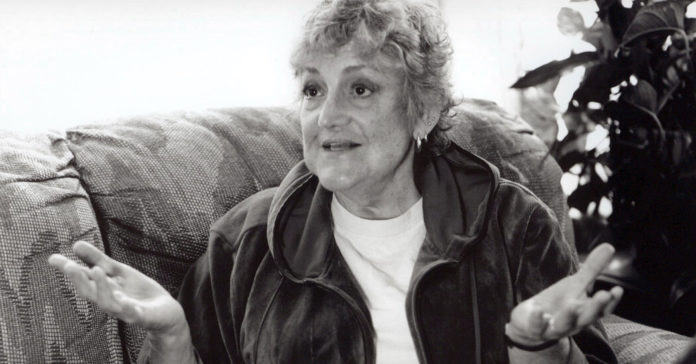
“I am a woman and a lesbian, a minority of minorities,” Madeline Davis told the 1972 Democratic National Convention in Miami Beach. “Now we are coming out of our closets and onto the convention floor.”
That speech was heard by few outside the Miami Beach Convention Center, delivered just after 5 a.m. on July 12, and the party platform plank that she and other gay and lesbian delegates were supporting — a proposal to enact anti-discrimination statutes to protect gay and lesbian Americans — did not pass.
But it was still a watershed day for lesbian and gay rights. In taking the dais, Ms. Davis, who died on April 28 at 80, stood as the first openly lesbian delegate to a national political convention in the United States. Along with Jim Foster, a gay delegate from San Francisco, she spoke to an increasingly progressive-leaning party that would nominate George S. McGovern, the liberal senator from South Dakota, for president.
In 2012, after the Democratic Party had included in its platform, for the first time, language about marriage equality, Ms. Davis reflected on her pioneering efforts decades earlier in an interview with NPR. “I’ve been working in gay rights for 40 years,” she said, “so I came to this information after a long journey, and I thought, Isn’t that nice?”
She died at her home in Amherst, N.Y., near Buffalo, from complications of a stroke, her wife, Wendy Smiley, said.
Ms. Davis began engaging with the lesbian community in 1957, though she did not come out until the 1960s, she told The Empty Closet, a gay publication based in Rochester, N.Y., in 2004. She began writing and performing folk songs early, and later added gay liberation anthems to her repertoire.
One was “Stonewall Nation,” a tribute to the 1969 uprising in New York that has been credited with sparking the gay rights movement. The song, performed in a lilting voice reminiscent of Joan Baez, includes the line “You can take your intolerance and shove it.”
“I went to the first march I ever attended in 1971, and I was so high from that experience that on the way home I wrote in my notebook the words to ‘Stonewall Nation,’” Ms. Davis told the radio show and website “Queer Music Heritage” in 2012.
Her work with gay rights groups attracted the attention of the New York State Democratic Party, which named her a delegate to the national convention from her Buffalo congressional district, pledged to Senator McGovern. The New York Times mentioned her as among “five self-proclaimed homosexuals” who would attend as delegates or alternates from New York State.
Ms. Davis later taught a course, “Lesbianism 101,” at the State University of New York at Buffalo. She described it as the first university-level class on lesbian history and culture.
With Elizabeth Lapovsky Kennedy, she wrote “Boots of Leather, Slippers of Gold,” which traced the history of the lesbian community in Buffalo. It won a Lambda Literary Award for Lesbian Studies in 1994.
Ms. Davis’s primary occupation was librarian; she eventually became the chief conservator and head of preservation in the Buffalo and Erie County Public Library System.
Madeline Dorothy Davis was born on July 7, 1940, in Buffalo to Joe and Harriet (Morris) Davis. Her mother worked in Erie County’s social services department. Her father worked in a Ford Motor Company plant, where he was a union organizer.
Ms. Davis attended Bennett High School in Buffalo and graduated in 1958. She earned an undergraduate degree in English and a master’s degree in library science from SUNY Buffalo.
Ms. Davis was married to Allen Romano in the 1960s. The marriage lasted three years. When she came out as a lesbian in the early 1960s, her family took it “very casually,” she told Playboy magazine in 1973 (for an article titled “New Sexual Life Styles”), and her friends, who were part of the counterculture, accepted her easily.
She met Ms. Smiley in 1974 after performing in a cafe, and they reconnected 20 years later at a community Seder, Ms. Smiley said in her eulogy.
Ms. Davis and Ms. Smiley held four marriage ceremonies over the years before the state recognized their union; the final one, making it legal, was at Temple Beth Zion in Buffalo in 2011. “And then we agreed, enough was enough,” Ms. Smiley said. They were together for 28 years.
In addition to Ms. Smiley, Ms. Davis is survived by her sister, Sheila Davis.
In 2001, Ms. Davis founded an archive of the Buffalo region’s L.G.B.T.Q. history. Originally housed in Ms. Davis and Ms. Smiley’s basement, it was donated to SUNY Buffalo in 2009. In 2016 Ms. Davis received an honorary doctorate from the State University of New York.
After a stroke in January, Ms. Davis received more than $30,000 in support for home health care through an online fund-raiser. “Thank you for a lifetime of important work,” one donor wrote.
That work largely began in the small hours of a July morning in Miami Beach in 1972, when she spoke into a convention-hall microphone so that gay and lesbian Americans might finally be heard.
“I made that speech,” she told Playboy, “because I knew there were gay people out there at 4 o’clock in the morning, sitting in front of their television sets, waiting to see one of their own people stand up.”








